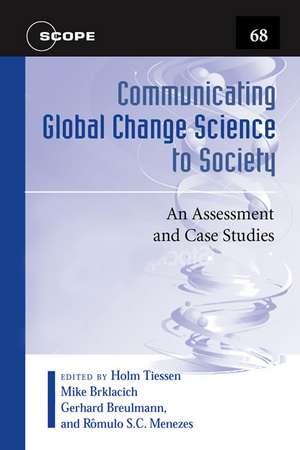Communicating Global Change Science to Society: An Assessment and Case Studies: Scientific Committee on Problems of the Environment (SCOPE) Series, cartea 68
Editat de Holm Tiessen, Michael Brklacich, Gerhard Breulmann, Romulo S.C. Menezesen Limba Engleză Paperback – iul 2007
National governments and research scientists may be equally concerned with issues of global environmental change, but their interests-and their timelines-are not the same. Governments are often focused on short-term effects and local impacts of global phenomena. Scientists, on the other hand, are loath to engage in speculation about the specific consequences of large-scale environmental trends.
How then can we translate scientific understanding of these trends into public policy?
Communicating Global Change Science to Society examines the growing number of instances in which governments and scientists have engaged in research projects in which the goal is to inform policy decisions. It assesses these experiences and suggests their implications for future collaborations.
The book begins with a discussion of interactions between science and policy, particularly as they relate to the broad significance of environmental change. It then addresses concerns that emerge from this discussion, including how scientific research results are communicated in democratic societies, the uses (and misuses) of scientific findings, and what the natural and social sciences could learn from each other.
How then can we translate scientific understanding of these trends into public policy?
Communicating Global Change Science to Society examines the growing number of instances in which governments and scientists have engaged in research projects in which the goal is to inform policy decisions. It assesses these experiences and suggests their implications for future collaborations.
The book begins with a discussion of interactions between science and policy, particularly as they relate to the broad significance of environmental change. It then addresses concerns that emerge from this discussion, including how scientific research results are communicated in democratic societies, the uses (and misuses) of scientific findings, and what the natural and social sciences could learn from each other.
Preț: 163.51 lei
Preț vechi: 344.72 lei
-53% Nou
Puncte Express: 245
Preț estimativ în valută:
31.29€ • 32.73$ • 25.99£
31.29€ • 32.73$ • 25.99£
Carte indisponibilă temporar
Doresc să fiu notificat când acest titlu va fi disponibil:
Se trimite...
Preluare comenzi: 021 569.72.76
Specificații
ISBN-13: 9781597261777
ISBN-10: 1597261777
Pagini: 240
Dimensiuni: 152 x 229 x 13 mm
Greutate: 0.32 kg
Ediția:None
Editura: Island Press
Colecția Island Press
Seria Scientific Committee on Problems of the Environment (SCOPE) Series
ISBN-10: 1597261777
Pagini: 240
Dimensiuni: 152 x 229 x 13 mm
Greutate: 0.32 kg
Ediția:None
Editura: Island Press
Colecția Island Press
Seria Scientific Committee on Problems of the Environment (SCOPE) Series
Notă biografică
Holm Tiessen is Director of the Inter-American Institute for Global Change Research (IAI) and Professor on leave from the Georg-August Universität of Göttingen, Germany.
Gerhard Breulmann, a terrestrial ecologist, is Science Officer at the IAI in São José dos Campos, Brazil.
Mike Brklacich is Professor of Geography and Environmental Studies at Carleton University in Ottawa, Canada, and chairs the IAI’s scientific advisory committee.
Rômulo S. C. Menezes is Assistant Professor in the Department of Nuclear Energy at the Universidade Federal de Pernambuco, Recife, Brazil.
Gerhard Breulmann, a terrestrial ecologist, is Science Officer at the IAI in São José dos Campos, Brazil.
Mike Brklacich is Professor of Geography and Environmental Studies at Carleton University in Ottawa, Canada, and chairs the IAI’s scientific advisory committee.
Rômulo S. C. Menezes is Assistant Professor in the Department of Nuclear Energy at the Universidade Federal de Pernambuco, Recife, Brazil.
Recenzii
"Communicating Global Change Science to Society: An Assessment and Case Studies presents a thoughtful consideration of how we can use science in the service of society—a grand challenge for the 21st century if we are going to successfully mange the planet for the benefit of present and future generations. By exploring ways of creating knowledge partnerships between decision makers (government and business leaders, resource managers) and scientists, society can find sustainable ways of creating dynamic economies, while protecting and improving the environment in the face of rapid global environmental changes."


